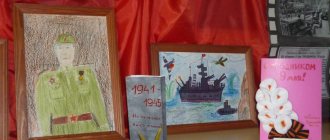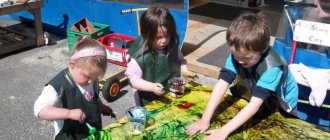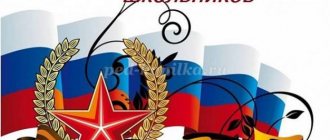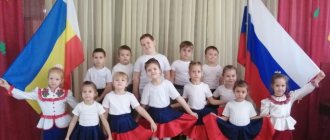Plan of events for the celebration of “Tolerance Week” in the preparatory group
Goal: To instill in children respect for the national cultures of different peoples of Russia.
Tasks:
— to cultivate in children friendliness, the desire for self-help, the ability to rejoice in the successes of others, the development of empathy and compassion;
- create a positive emotional mood in children, a cheerful, cheerful mood, feel the joy of movement;
- develop motor skills: strength, agility, speed, flexibility, endurance, coordination, communication skills for children to communicate with each other;
- broadening the preschooler’s horizons, understanding the world around him;
- formation of a harmoniously developed active personality, combining spiritual wealth, moral purity and physical perfection;
- introducing children to different nationalities, their customs, traditions, culture, understanding and respecting the customs, views and traditions of other people.
Motto:
The main thing is together!
The main thing is to be friendly!
The main thing is with your heart burning in your chest!
We don't need indifferent people in our lives!
Drive anger and resentment out of kindergarten!
| No. | Educational area | Event | Participants |
| During the week: - holding the “Let's Help the Kids” campaign (help with dressing, making gifts); - reading fiction about friendship (“The Braggart Hare” by N. Nosov, “Patch” by A. Akim, “My Relatives” by E. Charushin, “Little foxes.” Memorizing the poem “Unity Forever” by Natalya Maidanik);- watching thematic cartoons;- holding games of different nations (Russian, Tatar, Khanty, Tajik, Moldavian, etc.);- listening to national melodies. | |||
| 05.11.2013 | |||
| 1 | Communication | Thematic conversation “We are different, but we are friends!” | Children, teachers |
| 2 | Reading fiction, socialization | Design of the thematic book exhibition “We are all a friendly family!” | Children, teachers |
| 3 | Artistic creativity | Campaign “Let's live together!” | Children, parents, teachers |
| 4 | Consultation for parents “Tolerance, what is it?” | Parents | |
| 06.11.2013 | |||
| 5 | Communication, music, reading fiction | Direct educational activities on the topic “What is good?” | Children |
| 6 | Music, communication | Round dance games “Become a part of the round dance.” | Children, teachers |
| 7 | Physical Culture | Physical education "Cheerful Company" | Children, teachers, parents |
| 8 | Booklet for parents: “How to cultivate tolerance.” | Parents | |
| 07.11.2013 | |||
| 9 | Communication, work, socialization | Creation of the “Screen of Good Deeds”. | Children, teachers |
| 10 | Artistic creativity (drawing, applique). | Practical workshop: “Smile”, making “Give a smile to a passerby” stickers. | Children, teachers |
| 11 | Communication | Didactic exercise “Name your neighbor affectionately.” | Children |
| 12 | Replenishment of the corner for parents with the heading “Do good”, “How to help a child become kind”. | Parents | |
| 08.11.2013 | |||
| 13 | Artistic creativity (modeling). | NOD "Friendly guys" | Children |
| 14 | Communication, health, physical education, music | Final event “If you go on a journey with a friend.” | Children, teachers. |
Implementation of the project in educational areas:
Children's Day
(socialization, communication, artistic creativity, cognition, work, safety)
Promotion “Sending Greetings”
(socialization, communication, cognition, artistic creativity, labor)
Sports festival
"Games of different nations"
(physical culture, health, cognition, communication, socialization, safety)
Reading fairy tales of the peoples of the world, works of Russian and foreign writers
(fiction, cognition, socialization, communication)
Exhibition of children's drawings "My Friends"
(artistic creativity, communication)
Photo exhibition “We and our little brothers”
(artistic creativity, socialization, communication, cognition, safety)
Performances “Fly-Tsokotukha”, “Kolobok in a new way”
(socialization, communication, cognition, fiction)
Preparation of the performance
“The New Adventures of Little Red Riding Hood” and the festival of theatrical mini-productions “Theatrical Kaleidoscope”
Conducting workshops for teachers “Issues of developing tolerance in preschool practice”
Working with parents:
Production of folders “Rights and Responsibilities of Adults and Children”, brochures, wall newspapers, memos and recommendations for cultivating a tolerant attitude towards the world around us.
Meeting and conversation with Father Vladimir, a minister of the Alexander Nevsky Church.
Organization of joint activities, tea parties with parents.
III : Presentation of the project.
Lessons on tolerance in kindergarten
Our children live in a society open to new technologies, cultures and traditions. From an early age, the most important moral quality is instilled in preschoolers - kindness. The younger generation needs to instill the desire to be kind to every person on earth. Classes on tolerance in kindergarten in a playful way reveal to children the beauty of the world in its diversity, polyphony, and multinationality.
Planning Tolerance Week in kindergarten
The implementation of Tolerance Week is discussed and approved by pedagogical councils, usually in 2 stages:
Traditionally, Tolerance Week is held in kindergartens and schools in November - before the International Day of Tolerance (November 16).
Tolerance Week in kindergarten involves unusual activities and events:
As part of the Tolerance Week, child-parent events are held at the preschool educational institution
Table: example of planning for Tolerance Week
| date | Event | Participants | Responsible, organizers |
| 12.10 | Making posters and wall newspapers on the theme “Friendship of Peoples”, placing materials in the hall and recreation areas of preschool educational institutions. | Preschoolers of all ages together with parents and educators. | Teachers, senior teacher. |
| Integrated lesson “There are very different children on this huge planet.” | Pupils of the first and second junior groups. | Teachers and music director. | |
| Consultation for parents “Cultivating tolerance in modern society.” | Parents of middle, senior and preparatory groups. | Social educator, psychologist. | |
| 13.10 | Joint activity with parents “Educating tolerance through fairy tales.” | Parents and children of middle and senior groups. | Educators. |
| Physical education leisure “Moveable folk games”. | Younger preschoolers. | Physical education director. | |
| 14.10 | View a presentation and cartoon on the topic “What is tolerance?” | Pupils of the senior and preparatory groups. | Senior teacher, psychologist. |
| Musical leisure “Dances of the peoples of the world” (with master class). | Parents and pupils of junior and middle groups. | Educator, choreography teacher. | |
| 15.10 | Physical education “Sport unites countries and peoples.” | Pupils of middle, senior, preparatory groups. | Physical education director. |
| Exhibition-competition of crafts and drawings “The Magical Land of Tolerance”. | All preschool pupils (younger ones - together with parents and group work). | Teachers, head of the art group. | |
| 16.10 | Festive concert dedicated to Tolerance Day. | All preschool pupils. | Musical director, senior teacher, director of the theater studio. |
There may be several festive events (concerts) planned - for younger, middle and older pupils. This organization gives each group the opportunity to express themselves creatively and invite parents as spectators.
Source
The importance of teaching tolerance in kindergarten
Children have no prejudices. You smile openly and sincerely - you are a good person. You're fun to play with - you're a great friend. You tell me interesting things and help me learn new things - you are a wonderful teacher. The child strives to communicate. And he doesn't make any assumptions about people based on their skin color or eye shape. We can say that children are tolerant by nature. Their views are formed and undergo changes under external influence (adult conversations, statements on television, then thoughtlessly repeated by older children). Cultivating a sense of tolerance is one of the requirements for a modern teacher of a preschool educational institution (DOU).
A child chooses a playmate not by skin color, but by common interests.
The Russian Federation is a multinational state. In recent decades, migration processes have been intensifying in most regions. Groups in kindergartens are often mixed, that is, they are composed of children of different nationalities. The Federal State Educational Standard (FSES) establishes the provision of access to education for every child, regardless of nationality.
Interesting fact. Representatives of more than 200 nationalities (ethnic groups) live on the territory of the Russian Federation.
All children, regardless of nationality or language, love holidays
In the modern world, it is important to educate spiritual and moral values through the work of educational organizations (kindergartens, development centers, schools). But fostering kindness, sensitivity, and tolerance begins in the family. The activities of teachers within the framework of spiritual and moral development are revealed in classes at preschool educational institutions, in consultations and master classes for parents, and in holding festive events. Nowadays children are told a lot about their rights and sometimes they forget to emphasize that every member of society has rights and freedoms. These universal truths about respect for the individual in kindergarten are repeated with parents.
The concept of tolerance is broader than national tolerance. This is a person’s kind attitude towards people around him, whose views, religious beliefs, and appearance differ from his own. Classes on teaching tolerance in kindergarten include issues of national and cultural differences, instilling respect for people of different ages (both older people and children), and acceptance of people with disabilities.
Tolerance is a broad concept, but its essence is being kind to everyone who is different from yourself
Table: objectives of classes on tolerance in preschool educational institutions
In a fun way, preschoolers are taught knowledge about different countries and peoples.
Techniques for teaching tolerance in preschoolers
Cultivating a good attitude towards other people is part of the educational process in preschool educational institutions. Activities on tolerance are carried out starting from younger groups; the teacher takes into account the age and individual characteristics of children when planning classes. Among the methodological recommendations for instilling tolerance in preschoolers, the following techniques are used:
Lessons on tolerance, as a rule, are integrated: children talk, ask questions, study visual materials and engage in creativity
Video: master class “Cultivating tolerance in preschool children”
A master class for preschool teachers illustrates techniques for instilling tolerance in preschoolers: making crafts, dancing and playing music in a playful way. The host of the master class talks about cultivating tolerance through the study of native Russian life and immersion in folk art. More like an educational activity within the framework of familiarization with Russian folk culture. There is no mention in the master class of introducing children to other peoples and their characteristics. And tolerance can be cultivated through understanding and accepting the polyphony of the world.
Taking into account the individual approach to raising children, the teacher thinks through multi-level tasks for classes on tolerance. For example, didactic games are selected in accordance with the intellectual abilities of students. In the middle group, you can play a game with pictures that depict life situations: a boy and an elderly man are standing at a pedestrian crossing, a small child is crying in the sandbox next to a boy, a girl in a national Tatar costume does not dare to join a round dance. For children with a low level of logical thinking, a second set of cards has been prepared: the boy takes his grandfather across the road/the boy walks alone, the boy consoles the baby/the boy plays alone, the round dance participants explain the rules of the dance to the girl/the round dance continues with a new dance pattern. Children are given the task of matching the cards in the first set with the correct solutions to situations. Children with a sufficient level of intellectual abilities figure out how to act kindly and tolerantly for the children in the pictures.
Creative tasks are divided in a similar way:
Girls love to play with dolls, dress them up and comb their hair, so it’s worth preparing a lesson on national toys for them
Classes on tolerance education must be conducted in an entertaining way. The teacher’s arguments about tolerance towards representatives of different nations, cultures and religions will most likely be incomprehensible and uninteresting to children. It should be remembered that in preschoolers involuntary attention and memory predominate. Children focus their attention on what surprises and attracts, what they want to know as much as possible. Bright events, unusual activities and fun games are stored in memory as valuable experiences. The ability for voluntary attention begins to develop at the age of 6–7 years. Therefore, classes on tolerance in kindergarten must begin with creating motivation - stimulating the interest of preschoolers in subsequent activities.
It is important that classes on tolerance are interesting to children
Table: examples of a motivating start to a lesson on tolerance
Visualization is one of the means of motivating preschoolers, you just need to choose the right material: for younger ones - pictures and toys, for older ones - cards and photographs




